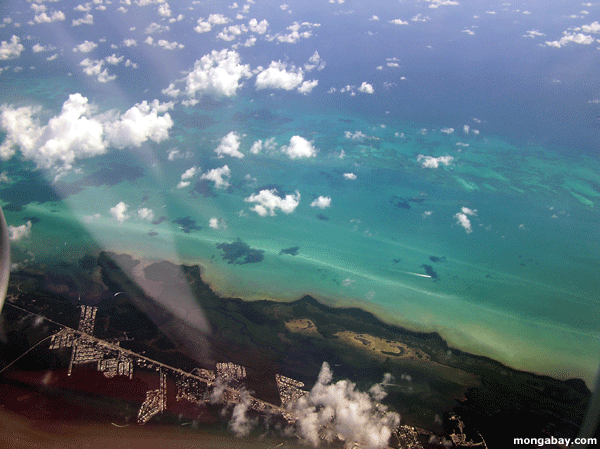|
|
|
 South Florida Coast
South Florida Coast
|
Hypoxia "dead zone" spreads to nearly 6,000 square miles of the Gulf of Mexico
"Dead zone" spreads across Gulf of Mexico
Wednesday, August 4, 2004
Posted: 11:26 AM EDT (1526 GMT)
Copyright 2004 Reuters
HOUSTON, Texas (Reuters) -- A huge "dead zone" of water so devoid of oxygen that sea life cannot live in it has spread across 5,800 square miles of the Gulf of Mexico this summer in what has become an annual occurrence caused by pollution.
The extensive area of uninhabitable water may be contributing indirectly to an unusual spate of shark bites along the Texas coast, experts said.
A scientist at the Louisiana Universities Marine Consortium said Tuesday measurements showed the dead zone extended from the mouth of the Mississippi River in southeastern Louisiana 250 miles west to near the Texas border and was closer to shore than usual because winds and currents.
"Fish and swimming crabs escape (from the dead zone)," said Nancy Rabalais, the consortium's chief scientist for hypoxia, or low oxygen, research. "Anything else dies."
In the last 30 years, the dead zone has become an annual summer phenomenon, fed by rising use of nitrate-based fertilizers by farmers in the Mississippi watershed, Rabalais told Reuters.
The nitrates, carried into the gulf's warm summer waters by the river, feed algae blooms that use up oxygen and make the water uninhabitable.
The dead zone's size has varied each year depending on weather conditions, but averages about 5,000 square miles and remains in place until late September or early October.
Virtually nothing is being done to stop the flow of nitrates into the river, meaning the dead zone will reappear every year, Rabalais said.
The dead zone forces fish to seek better water, which may be a reason for the recent shark bites on Texas beaches.
Three people have been bitten by sharks along the upper Texas coast this year -- a high number for a state that has recorded only 18 shark attacks since 1980.
Terry Stelly, an ecosystem biologist with the Texas Parks and Wildlife Department, said increasing numbers of sharks have been found in recent years in the waters along the Texas-Louisiana border, near the edge of the dead zone.
Along with other factors, "chances are good they (sharks) were looking for higher dissolved oxygen in the water," he said.
Rabalais agreed, saying "The higher number of sharks in shallow waters may very likely be due to the low oxygen being close to the shore at the time of the attacks."
"The available habitat for the sharks is definitely less when the low oxygen is so widespread," she said.
Copyright 2004 Reuters. All rights reserved.This material may not be published, broadcast, rewritten, or redistributed.
CONTENT COPYRIGHT Reuters. THIS CONTENT IS INTENDED SOLELY FOR EDUCATIONAL PURPOSES.
mongabay.com users agree to the following as a condition for use of this material:
This site contains copyrighted material the use of which has not always been authorized by the copyright owner. Such material is made available in an effort to advance understanding of environmental issues. This constitutes 'fair use' of any such copyrighted material as provided for in section 107 of the US Copyright Law. In accordance with Title 17 U.S.C. Section 107, the material on this site is distributed without profit. If you wish to use copyrighted material from this site for purposes of your own that go beyond 'fair use', you must obtain permission from the copyright owner.
If you are the copyright owner and would like this content removed from mongabay.com, please contact me.
|